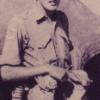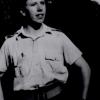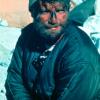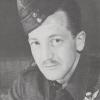It was Sunday and we were fighting in our last house in Oosterbeek village when we were told that we were to retreat. The house belonged to a Dutch dentist. It was in a mess, and some of his family were hiding in the cellar. We used to throw in sweets and other food when we could. We had heavy mortar and artillery barrage all the time - it was all noise. When the noise stopped we got worried, because then the troops would be corning in.
We were told we were to withdraw across the Rhine at 10pm. When we knew, we went round telling the Dutch civilians. We didn't want to go; didn't want to leave them behind. We were resigned to fighting, to being killed. I felt so angry. It seemed such a waste. Nine days of fighting and all those people killed and wounded and we had to leave the Dutch people behind. We wanted to stay.
We formed up in platoons outside on the grassland in the village at about and sty 9.30pm. It was pitch black and raining really hard. We'd cut up bits of blanket and tied them over our boots and bayonets. The tails of our camouflage smocks were loose and it was so dark we had to hold onto each other's tails as we walked. Some people just sat down and went to sleep, they were so tired. I could see shadows on the ground. We were meant to leave with 1 Platoon but it was so dark that somehow we were left behind.
It was lucky that we were left behind as 1 Platoon ran into a machine gun ambush and some were killed and wounded. Our CO, Major Bob Wilson, was hit by a bullet that scraped the bridge of his nose and he was knocked out.
We knew that the British artillery was across the river and were firing shells from two points on the far bank, about half a mile apart. So we knew where to head for and where the boats were going to he to get us across. Somehow four of us got separated from the platoon - Snowy Wheatley, Fred Weatherley, Lol Colbrooke and me. We huddled together in the woods by the river bank. I had my emergency rations of chocolate so we shared it and drank the rain.
All the time there were lights going overhead, people shuffling past us -just shadows- and the Germans were mortaring us. We were so tired we carried on plodding along in the woods, past shadows of bodies on the ground - some dead, some asleep and so missing getting the boats and escaping.
We eventually passed Oosterbeek Church and Kate Von Horst's house and finally came across the tail end of the queue waiting by river for the boats. The front of the queue was in the water. Suddenly about 50 men panicked and rushed forwards to get to the boats.
We decided to move away and walk down the river bank. Out of nowhere one of the boats came drifting towards us and into the bank right by us. It had broken down. We got in. It was a Canadian engineer's boat. They got the engine going but it failed again about halfway across. We were meant to have got rid of our rifles but I'd kept a German rifle - much better than ours - and used it to paddle across.
When we reached the far bank, one of the Canadians said, 'Go that way' and I set off in the pitch blackness and found myself alone. I kept falling into shell craters, climbing out, then falling into another until I eventually reached a road. As I walked on every now and then a British soldier would step out of the darkness and say 'not far now' and point up the road. It was actually about five miles, but I was so tired I just kept trudging along. I still had blankets on my boots but I was too tired to stop and take them off.
Then, finally I reached a small tent with one of the Medical Corps in there. They gave me a cigarette and a small drink of rum or brandy. I waited until transport arrived and was taken to Elst, then to Nijmegen, which was held by the US. It was light by then and we were led into a big German school or barracks, given a bed in a dormitory and left to sleep.
The next day, I went to the cookhouse and queued for tea. Some of the company had found each other and we stayed together. Then we saw our CO, Major Wilson, at the end of the queue and we cheered as he'd survived, he'd made it across. He had a plaster over his nose where the bullet had hit him. At first he didn't recognise us as he was still dazed.
Later in the day we left for Belgium in the TCVs and got shelled some of the way. We passed the British tanks and they'd really taken a hammering. Dead bodies were strewn everywhere. What a waste. We eventually got back to England in US Dakotas.
We weren't relieved to get back. You see, there was all those we'd left behind, the Dutch people and our friends. When we got back home it was then that we started to find out who was missing.
Compiled by Jan Scott
Read More




Latest Comments
There are currently no comments for this content.
Add Comment
In order to add comments you must be registered with ParaData.
If you are currently a ParaData member please login.
If you are not currently a ParaData member but wish to get involved please register.